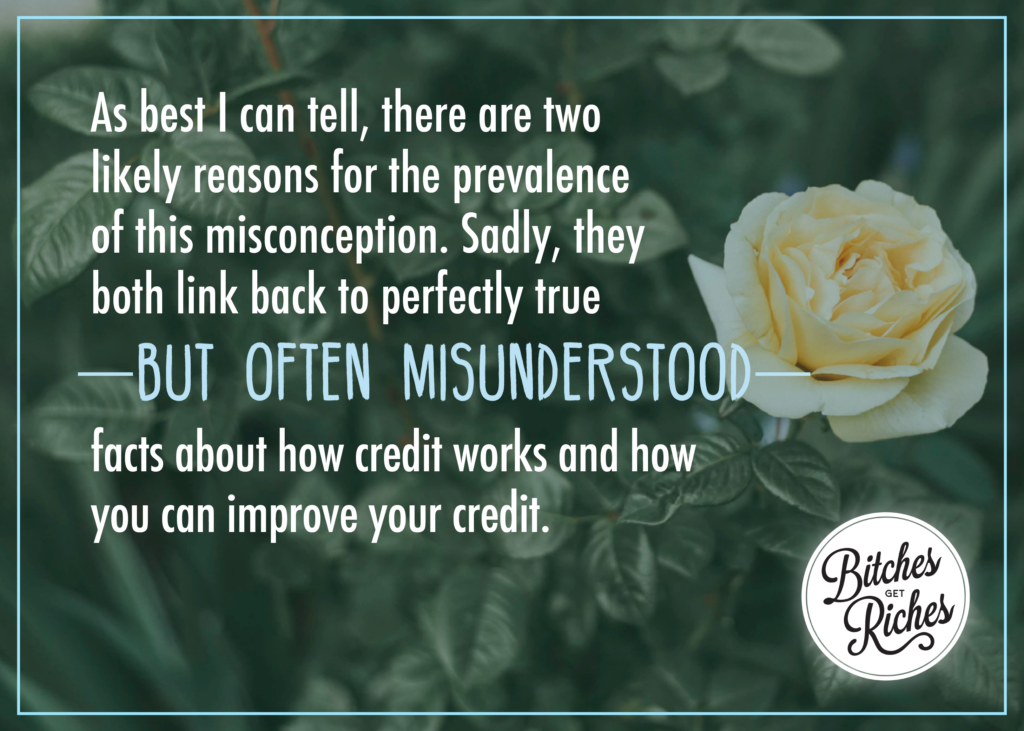Let’s End This Damaging Misconception About Credit Cards

I don’t know who started the rumor that carrying a balance on credit cards is good for your credit score, but I think they should be drawn and quartered. Of all the damaging misconceptions about personal finance we’ve had to correct over the course of running Bitches Get Riches, this is by far my least favorite. And it keeps popping up again and again in questions from our followers! Why? How? Who is teaching all of our darling kangaroo babies such a terrible way of handling their credit cards? Until I can find the culprit and give them their just desserts (hot oil? the rack?), I have made it my mission to set the record straight.
Paying interest doesn’t help your credit score
The shitty advice goes something like this:
“Don’t pay your credit cards off at the end of every month. Instead, keep a small amount of money on a card so it carries over to the next month and earns the credit card company interest. The credit card company will like this, and thus, improve your credit score!”
This advice is akin to taking $10, putting it into the blender with some leafy greens, and drinking it as a kale smoothie for all the good it will do your finances. At best you’ll end up poorer by $10 and probably with some unpleasant intestinal gas to boot. Your credit card company does not determine your credit score, so you have no need to make them happy. Instead, they report your activities to credit reporting bureaus like Equifax, TransUnion, and Experian, who then take that information, swirl it around in a vat with some other numbers, and spit out a credit score.
If you want to know what else goes into your credit score, we wrote all about it here:
The only thing carrying a balance does is accrue interest…interest that you then have to pay back to the credit card company in addition to the rest of the money you owe them. In other words, this bad fucking advice is literally costing you money for no goddamn reason.
Pay off your credit card in full and on time
Having a good credit score is important for all kinds of reasons. It helps you get better terms on things like mortgages, student loans, and credit cards. A bad credit score, by contrast, can prevent you from renting an apartment or financing a car, among other things. So it’s totally understandable why someone would try anything to get a good credit score! And that’s why lots of us fall prey to shitty advice about credit in an attempt to stay out of trouble and in the black.

But there is no better way to build credit than to pay your bills in full and on time every time. This includes your credit card bill. There are tons of things you can do to help improve your credit if it’s already shit. But this one good habit — on time, in full — will save you from getting your credit in the hole in the first place. Here’s some more advice on how to improve your credit:
- How to Build Good Credit Without Going Into Debt
- How to Instantly Increase Your Credit Limit
- The “Best” Way to Pay Off Credit Card Debt
On top of all that, if you don’t carry a balance on your credit cards from month to month, you’ll never accrue interest. And if you never accrue interest, you’ll never have to pay it back. Which means you’re basically getting to use the credit card company’s money for free. #winning #bossbitch
The origins of this infuriating myth
As best I can tell, there are two likely reasons for the prevalence of this misconception. Sadly, they both link back to perfectly true — but often misunderstood — facts about how credit works and how you can improve your credit.
The first is credit utilization. This is the amount of credit available to you vs. what you’ve used. Many a personal finance guru suggests not going over a 30% utilization rate to help your score (though this is more of a guideline than a hard-and-fast rule). This means never ever using more than 30% of your credit limit. It does not mean you should always have 30% of your available credit tied up in debt. But I could see how this advice would get mangled to sound like you should. Again: pay your credit cards off in full and on time every month.
The second is timing. The conventional wisdom goes that if you pay your debt too soon, the information that you used your cards won’t make it to the credit reporting bureau, and then you won’t get “credit” (see what I did there?) for using the cards. You should, therefore, wait long enough to ensure the credit reporting bureau “notices” your usage. (How long? Literally no one had an accurate answer when I was researching this post. Definitely before the due date, though.) Using your credit cards does, in fact, help your credit score, insofar as it shows you are capable of responsibly using credit. But I can see how advice to “wait for the charge to be included in your credit report” could insidiously morph into “wait until after the charge has earned interest.”
Let’s simplify the question of timing. It’s way more important that you pay your credit cards off by the due date every month than that you leave a balance on the card long enough to be calculated into your credit report. Full stop. So to be clear: pay your credit cards off in full and on time every month.
I beseech you, I implore you, I beg you!
Do I sound like a broken record yet? If you can afford it, paying your credit card bill in full and on time every billing cycle is the best possible thing you can do for your credit and your general financial well being. If you can’t pay it off in full, pay off as much as you can! Even if the balance is super low, pay it off! You have no reason to wait and roughly 9,000 reasons to act.
Just pay your card off. Fucking pay it off! Don’t listen to the siren song of shitty old wives’ tales about credit cards. Don’t be confused by the mysterious ways in which credit works! For fuck’s sake, pay the goddamn card off! PAY YOUR MOTHERFUCKING CREDIT CARDS OFF IN FULL AND ON TIME EVERY MONTH. JUST FUCKING DO IT.
Please.
Think of the children.
Kitty and Piggy are head bitches in charge of Bitches Get Riches, a blog about finance, feminism, and fresh af RuPaul gifs. Sometimes they write about guinea pigs and video games. You can follow them on Twitter and Tumblr.
Image via Unsplash




